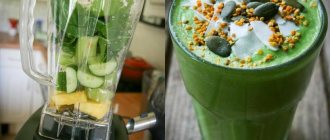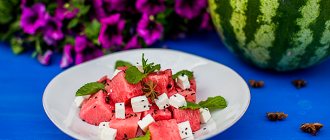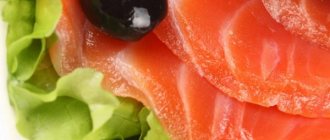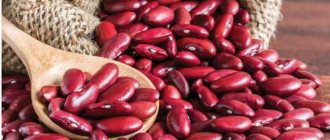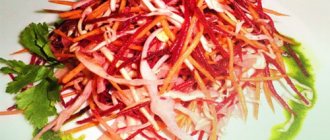Diet programs aimed at losing weight and detoxifying the body often use seasonal fruits. From mid-August to the end of September, nutritionists recommend consuming watermelon for weight loss. Despite the high glycemic index (about 75-80 units), its calorie content is low and amounts to 30 kcal per 100 g of pulp, which allows the active use of watermelon fruits in dietary nutrition.
In the article we will consider the following questions: the benefits and harms of fresh watermelon pulp for the body, calorie content, can those losing weight eat watermelon, menu options and duration of the diet, advantages and disadvantages of watermelon weight loss programs, contraindications.
Watermelon for weight loss
Watermelon lovers can not only enjoy their taste, but also lose excess weight. When dieting, watermelons are allowed to be included in the diet because they are low in calories and contain virtually no fat or harmful carbohydrates.
By the time of ripening, glucose and fructose predominate in the fruits , and only during storage of watermelon does sucrose accumulate, which is harmful to the figure. In addition, the fruits have a rich vitamin and mineral composition: B vitamins, beta-carotene, lycopene, potassium, calcium, copper, phosphorus, magnesium.
Watermelon stimulates digestion , improves intestinal function, activates metabolism, and removes toxins from the body. Plant fiber, which fruit pulp is so rich in, absorbs water well and creates additional volume in the stomach, which is necessary to suppress appetite.
In addition, fiber accelerates the process of fat breakdown , this prevents local accumulations of subcutaneous fat, increases endurance and performance, which leads to increased physical activity and additional calorie burning.
Composition and properties
The main component of watermelon pulp is water (90-92%) and contains minimal amounts of fats and carbohydrates. Watermelon fruits are also rich in dietary fiber. The composition does not contain starch and cholesterol, but high concentrations of vitamins and minerals are found. Mineral salts contain calcium, potassium, zinc, magnesium, sodium, fluorine, iron, copper, manganese.
Among the vitamins, there is a high content of B vitamins (choline, riboflavin, thiamine, pyridoxine, pantothenic acid, thiamine), in second place is vitamin A (includes beta-carotene and beta-cryptoxanthin), followed in descending order by ascorbic and nicotinic acids, betaine , vitamins E and K.
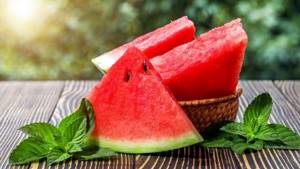
Watermelon has a wide range of therapeutic activity , allows you to improve the health of the body as a whole, helps in the treatment of many diseases, and serves as a good preventive measure for diseases of the cardiovascular, digestive, urinary and nervous systems.
The berry has a pronounced diuretic , carminative, antipyretic, antispasmodic, anti-inflammatory, laxative effect, participates in hematopoiesis processes, normalizes water-salt balance and metabolism, removes waste and toxins from the body, relieves muscle pain, strengthens the immune system.
Advice. To get the most out of watermelon, it is advisable to eat your own fruit, grown without the use of pesticides. Otherwise, when choosing berries at the market or in a store, pay attention to external quality indicators. These are size, shape, stalk, sound, pattern, yellow soil spot, as well as storage conditions. After cutting a watermelon using a nitrate meter or improvised means, it is recommended to check the pulp for nitrate content.
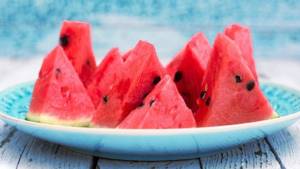
Calorie content and BZHU
Watermelon is classified as a low-calorie product - 30 kcal per 100 g of fresh pulp. The protein concentration is relatively low - 0.6 g per 100 g of edible part, and there are practically no fatty substances at all - 0.2 g.
Fruits contain easily digestible carbohydrates:
- glucose - 1.58 g;
- fructose - 3.36 g;
- sucrose - 1.21 g;
- maltose - 0.06 g.
Due to the presence of fast carbohydrates, watermelon has a high glycemic index - 75 units. Eating foods with a high GI is contrary to weight loss. So is it possible to eat watermelon during a diet in order to correct body weight and cleanse the body? The answer is unequivocal - yes. The fact is that the GI of watermelon itself is not very informative. The berry consists of 90-92% water, which is already beneficial for weight loss, helps cleanse the intestines of waste and toxins, and get rid of puffiness.
And most importantly, carbohydrates in ripe fruits are represented by fructose and glucose , and harmful sugar appears only during storage. To lose weight and improve the health of the body, you can use ripe and high-quality fruits, but green and overripe ones are strictly contraindicated.
About other ways to lose extra pounds:
Why is brown rice good for weight loss?
Cooking and drinking pumpkin juice for weight loss
Dill: a tasty and healthy way to combat excess weight
Nutritional value and calorie content of berries
The most significant advantage of the striped berry is its low calorie content. Due to the content of a large amount of water (almost 93%) and fiber, its energy value is 30-35 Kcal per 100g. Therefore, you can eat as much watermelon as you like in the evening and not gain weight.
The striped giant contains the least amount of fat - only 0.1 g per 100 g of pulp. Proteins are 0.6g, and carbohydrates are 6g. Watermelon pulp contains many vitamins: A, C, E, PP, group B. By eating a kilogram of juicy berries, you can replenish your vitamin C supply by 78% of the daily value.
Of the macroelements, watermelon contains a lot of silicon (40% of the daily value in 100g), potassium (4.4%), magnesium (3%), calcium (1.4%). It is also rich in sodium, phosphorus, chlorine and sulfur.
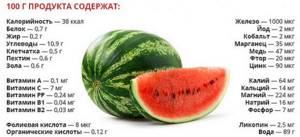
It contains the following microelements: cobalt (20% of the daily value), iron (5.7%), copper, molybdenum, manganese, zinc.
Among the amino acids of watermelon pulp, arginine, lysine, lycopene, aspartic, and glutamic acids are known. By treating yourself to 2-3 pieces of berries, you can saturate your body with 10.5% of the daily value of Omega-3 and 5% of Omega-6.
Thanks to its rich composition, the juicy giant has diuretic, choleretic, cleansing, tonic, and immunostimulating properties. It normalizes metabolism, blood composition, and puts the cardiovascular, nervous, and endocrine systems in order. It also improves the functioning of the gastrointestinal tract and urinary system, improves mood, and reduces weight. Therefore, watermelon is often used in various diets for weight loss.
Is it possible for those losing weight to eat watermelon?
Many famous nutritionists advise using watermelon for weight loss . The diet is based on the fact that fruit pulp normalizes metabolism and improves digestion, and under the action of lipase, fats are broken down into fatty acids. The berry contains a lot of insoluble fiber, which absorbs and removes toxic substances and excess fluid from the body, provides quick and long-term saturation with one small portion, and allows you to avoid snacking.
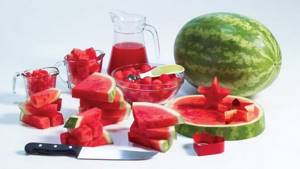
Some experts believe that the watermelon diet, due to its low calorie content, has an adverse effect on health, because watermelon cannot contain a full range of vitamins and minerals. To meet the body's needs for micro- and macroelements, you need to include a variety of foods in your menu.
Description and characteristics of watermelon
Getting acquainted with the main object of this article should begin with a consideration of its chemical composition and calorie content, which will help to better understand what the benefits or harm are.
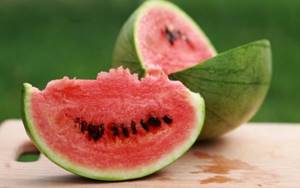
Chemical composition
The chemical indicators of a watermelon fruit come down to three main ones. So, 100 g of product contains 0.6 g of protein, 0.1 g of fat, 5.8 g of carbohydrates. In addition to these characteristics, the chemical composition is described by vitamins: A, B1, B2, B6, B9, C, E, H and PP; minerals: potassium, calcium, magnesium, iron, phosphorus and sodium. The lion's share of the fruit's weight is occupied by dietary fiber and water.
Calorie content of watermelon
If we talk about how many calories are in watermelon, then for every 100 g of product there are about 23-25 kcal, depending on the sweetness of the berry.
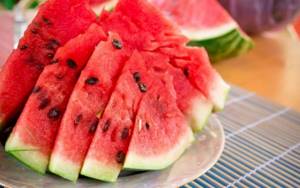
Watermelon diet: menu options and diet duration
The diet can consist of one watermelon (mono-diet) or include an extended list of products . The mono-diet is designed for 5 days. Due to the low calorie content and unbalanced diet, increased urination, and changes in stool consistency, such a weight loss program can be recommended for people who do not have health problems. The diet includes watermelon pulp at the rate of 1 kg per 10 kg of human body weight + 1.5-2.5 liters of purified still water. The entire volume of food is divided into 5-6 meals.
A gentle watermelon diet is eating watermelons for 10 days (1 kg per 10 kg of weight). Allowed products include rye, bran or whole grain bread. In this case, it is necessary to consume at least 1.5 liters of free liquid. This could be distilled water, herbal teas, green tea without sugar.
Advice. With any diet option, it is recommended to additionally take complex preparations containing an assortment of vitamins and minerals.
How many kg can you lose weight and over what period?
The maximum result is minus 10 kg in 10 days . This is possible if you add exercise to your diet. However, such rapid weight loss can harm your health and slow down your metabolism. Therefore, the best option would be a ten-day gentle diet, with which you can lose from 3 to 7 kg of excess weight.
How to lose 7 kg in five days on a watermelon diet
Quitting the diet
Exit from the watermelon diet should be gradual . To ensure that the efforts made are not in vain, and the lost kilograms are not returned with interest, nutritionists do not recommend abusing “junk foods.”
Habitual foods are introduced into the diet gradually and in small portions . At first it is low-calorie cottage cheese, cheese, fermented milk products, after a few days you can add lean salads, vegetable soups with water, then lean meat (chicken, veal) and fish. All this time, do not forget to eat fresh watermelon pulp daily at the rate of 1 kg per 30 kg of weight.
Advantages and disadvantages of the watermelon diet
| pros | Minuses |
| Guaranteed weight loss | The watermelon diet has contraindications, so before you start losing weight, you should consult your doctor. |
| No need to cook or count calories | The diet is unbalanced, and in order not to harm the body, you need to follow a dietary regime for no more than 10 days in a row |
| If you exit the diet correctly, you can maintain the results obtained for a long time. | Risk of allergic reactions and food allergies |
| Cleanses the body well, relieves swelling | Frequent urination and changes in stool consistency may occur. |
| The food is tasty, summery and healthy | Due to the increased content of fruit acids, watermelon pulp can irritate the mucous membranes in the presence of erosive and ulcerative pathologies of the gastrointestinal tract, acute liver and kidney diseases |
| Provides quick and long-lasting satiety, making the diet easier to tolerate and the risk of failure is minimal | |
| Availability. The seasonal market price for 1 kg of watermelon varies between 25-35 rubles, so on average 150-200 rubles are needed per day of the diet. |
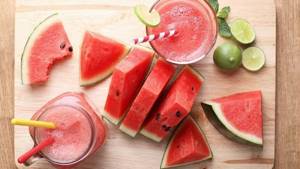
Specifics of the watermelon diet
Watermelon is characterized by its ability to accelerate the process of weight loss, which is due to several factors:
- diuretic effect, due to which excess fluid is removed from the body, which leads to a loss of approximately 2 kg of weight;
- maximum filling of the stomach due to which the feeling of fullness does not go away for several hours.
This diet is not recommended in the last stage of pregnancy, as well as in the presence of a number of diseases.:
- diabetes mellitus with simultaneous failure of the kidneys;
- irritable bowel syndrome;
- pathology of one or more organs of the urinary system, formation of stones;
- prostate adenoma.
Important! Before you start following a watermelon diet, you need to do an analysis and compare the benefits and harms, otherwise there is a risk of harm to your health.
Advantages and disadvantages
The advantages of this diet are as follows:
- easy tolerability;
- effective cleansing of the body by getting rid of excess fluid and toxins;
- regulation of metabolic processes;
- lack of hunger;
- availability of berries in season and optimal cost;
- the opportunity to get excellent results in a short period of time.
The disadvantages of the diet include:
- the minimum content in watermelon of protein, fat, protein, etc., necessary for the full functioning of the body;
- increased load on the urinary system, leaching of useful substances such as sodium and potassium from the body.
It should be remembered that in the first days of the diet, only liquid leaves the body, so in case of failure, water and weight will immediately return back.
Fasting day on watermelon
Using watermelon you can detoxify your body . Since fruit pulp has a pronounced absorbent effect, it cleanses the liver, kidneys, blood and intestines well. For those who want to get rid of a couple of extra pounds, a one- or two-day fasting day is ideal.
During the day, you can only eat fresh fruit pulp and drink plenty of water . Despite the fact that watermelon itself is 90% water, free liquid is necessary to speed up the process of eliminating waste and toxins.
Important! Due to its low calorie content, this diet is considered strict, so it can be used no more than once every 10-14 days.
Contraindications
Despite the effectiveness and usefulness of watermelons for weight loss, such a diet has contraindications . The consumption of watermelons is limited by such diseases and pathological conditions as:
- urolithiasis and other problems with the urinary system;
- allergy to watermelon;
- diseases of the digestive system of an erosive and ulcerative nature, especially in the acute stage: gastritis, peptic ulcer of the stomach and duodenum;
- diabetes mellitus type 2 and 3;
- diarrhea.
Women during pregnancy and breastfeeding , children and adolescents, and the elderly should eat watermelons with caution.
Benefits for athletes
Despite the virtual absence of proteins in the striped berry, it is very useful for athletes. The citrulline it contains becomes arginine in the body. This essential acid is needed to build protein. It increases blood circulation and helps build muscle mass.

Therefore, the answer to the question “Can athletes eat watermelon after training?” unequivocal: Yes, it is possible, even necessary. It doesn’t matter whether it’s morning, afternoon or evening! Watermelon will saturate the body with moisture, promote muscle development, and also help recover after heavy physical activity.
Tips and tricks
Observing certain rules for consuming fresh pulp as part of fasting days and dietary programs will help you get the maximum benefit from watermelon:
- Do not buy fruits before August; most likely, they contain nitrates, which accelerate the growth and ripening of melons.
- Choose large, but not heavy watermelons. Ideally, the fetus should weigh 6-11 kg.
- Pay attention to appearance. A ripe berry of appropriate quality will have a dry stalk, a shiny top layer without a matte coating, and a small yellow earthen spot on the side.
- Do not take limp fruits; the content of vitamins and minerals in them has decreased as a result of long-term storage.
- For dinner when losing weight, eat a small portion of watermelon - 200-250 g.
- It is mandatory to adhere to the drinking regime - from 1.5 to 3 liters of clean water per day. You can have several cups of green unsweetened tea.
- Exit from the diet should be gradual.
- The last meal should not be later than 18.00.
- After completing the diet, it is important to limit harmful carbohydrates, unhealthy foods, and not consume sugar, if possible replacing it with a small portion of natural honey.
And most importantly, to speed up the process of losing weight and consolidate the result, be sure to go in for sports . Physical activity helps avoid the feeling of bloating, excessive gas formation, and improves skin condition.
The right way out of the diet
In order for the effect of the diet to last for a long time, you need to properly plan your nutrition during the post-diet period. You can’t start eating unhealthy foods right away. Eating the same as before is the biggest mistake of all those losing weight. Exiting a mono-diet should take place in several stages:
- For the first 1-2 days, add fermented milk products to the watermelon to taste;
- For the next 1-2 days, include other fruits and vegetable salads in the menu.
- Next, add stewed vegetables, soups, and cereals.
- At the fourth stage, add lean dry meat.
It is better not to eat fatty, very salty and sweet foods at all. If you really want to, you can eat them in small quantities and be sure to combine them with raw vegetable dishes (cut vegetables or salads) in a 1:3 ratio. Even after dieting for further weight loss, include watermelon in your daily diet, especially in the evening. At this time, active cleansing processes of the body are launched. By following these tips, you can maintain or even improve (if you are overweight) the result obtained during the diet.
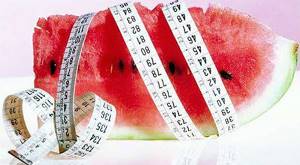
Reviews of those losing weight
The watermelon diet has many reviews. Those who have experienced this diet for themselves say that positive results are noticeable after just a few days of this diet . After 2-3 days, you feel light, bowel function normalizes, and upon completion of the course, a weight loss of several kilograms is noted.
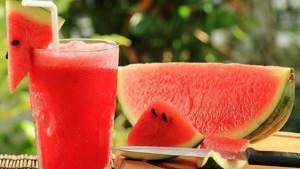
Olga, 32 years old : “I always look forward to summer and watermelons. Eat delicious sweet fruits and lose weight. It’s probably impossible to think of an easier way to get rid of extra pounds. As a bonus, you get well-groomed, healthy skin and a good mood.”
Christina, 25 years old : “Every year I follow a watermelon diet. The effect is great. It takes 5-6 kg in 10 days, and if you combine it with summer active recreation, you can achieve better results. My personal record is minus 8.5 kg. In addition, the diet is not expensive and is easily tolerated.”
Claudia, 42 years old : “I found for myself the best way to use watermelon for weight loss - these are fasting days. I tried a mono-diet designed for 10 days, but it was difficult to eat only fruit pulp, water and a few slices of rye bread. Due to the reduced calorie content, I experienced only a short-term feeling of satiety; after 1-1.5 hours I was tormented by hunger. And fasting days are easily tolerated, give a feeling of lightness in the stomach, and improve overall well-being. During the watermelon season, every 10 days I arrange a one-day fasting day. Very pleased with the results and appearance.”
Features and consequences of eating berries at night
Many people are concerned about the question of whether it is possible to eat a little watermelon at night when losing weight. If we are talking about the influence on the figure, then the answer will be positive: “Yes, you can! It won’t ruin your figure.” Watermelon pulp can be used to replace an evening snack if you cannot do without it. But it is better to eat it in small quantities and no later than 1.5-2 hours before bedtime. Otherwise, frequent urges to go to the toilet will not allow you to sleep peacefully.
1-2 small pieces of berries eaten 2 hours before bedtime can create a significant positive effect:
- will make an additional contribution to the weight loss process. If unhealthy meals in the evening can harm your figure, then the striped fruit, on the contrary, will contribute to a deeper cleansing of the body and weight loss;
- will help you cope with evening cravings, if you have any. Sometimes people want to eat something unhealthy in the evening. To suppress this desire, you can consume a little watermelon pulp. Sweet juicy pulp will fill the stomach and dull the feeling of hunger;
- will have a positive effect on the condition of the reproductive system, especially in men. The fruit increases blood circulation in the genital organs, acting as an aphrodisiac. At night this action will be very useful for many;
- thanks to magnesium and essential amino acids, they will calm your nerves, improve your mood, and promote a good night's rest.
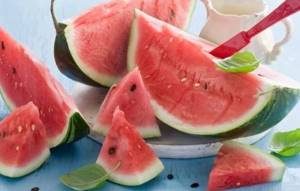
Remember! It is advisable for pregnant women and children under 7 years of age to avoid eating the pulp of the juicy fruit after 18-00. Otherwise, children may wet themselves, and a pregnant woman may experience heaviness in the gastrointestinal tract, swelling, or frequent nighttime urges to go to the toilet.
Recommendations for consuming striped giant in the evening:
- Eat small amounts only to satisfy your hunger.
- Do not eat watermelon immediately after eating. This can lead to gas formation and bloating. Anxiety in the gastrointestinal tract can disrupt sleep.
- Do not combine watery pulp with salty, smoked, fatty and spicy foods. They retain fluid. Otherwise, instead of removing excess fluid in the morning, it is easy to gain additional pounds and swelling.



